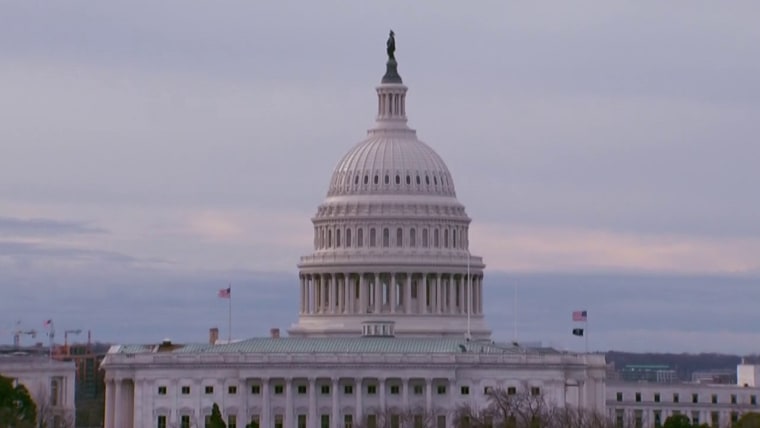WASHINGTON — The Senate passed a short-term spending bill Thursday night to prevent a government shutdown that was set to take place Saturday unless Congress acted.
Senators voted 65-27 to pass the funding measure that will keep the government's lights on through March 11. Lawmakers in both chambers are working to finalize a broader deal on a spending package for the fiscal year that ends Sept. 30.
The House passed the short-term bill, known as a continuing resolution, in a 272-162 vote last week. President Joe Biden signed the measure into law on Friday.
Senate leaders in both parties this week repeatedly said there was no real risk of a shutdown. But a quartet of GOP senators had delayed quick passage of the bill by demanding votes on key conservative priorities.
That infuriated senior Democrats who warned that the partisan infighting sent the wrong message to the global community — and to Russian President Vladimir Putin — at a critical moment when top U.S. officials are warning the Kremlin not to invade Ukraine.
“Everybody has the right to speak. Everybody has the right to make any kind of political point for any group they want. But let’s talk about being U.S. senators! A war is about to start in Ukraine!” Senate Appropriations Chairman Patrick Leahy, D-Vt., thundered on the Senate floor Thursday. “What we’re saying is we will start putting all these things in to slow up a continuing resolution so the United States government can shut down tomorrow night.
“Putin can say, ‘Why should I listen to them? Three or four people can go on their Senate floor and shut down the government.’”
The four GOP issues that delayed passage of the funding bill were all domestic in nature.
Sen. Marco Rubio, R-Fla., wanted a vote on a bill — also backed by Sen. Joe Manchin, D-W.Va. — to bar the Department of Health and Human Services from funding the distribution of crack pipes. Biden administration officials say a $30 million HHS program aimed at fighting the substance use and overdose epidemic doesn’t pay for crack pipes.
Rubio took to the floor Thursday to try to pass the crack-pipes legislation by a simple voice vote, but Democrats objected.
Democrats also defeated three amendments offered by conservative Republicans. The first, by Sen. Mike Braun, R-Ind., would have required the government to balance its budget every year.
Two other amendments focused on Covid-19 mandates. Sen. Mike Lee, R-Utah, demanded a vote to strip out funding for the enforcement of all remaining federal vaccine mandates, while Sen. Ted Cruz, R-Texas, got a vote on an amendment to block funding for schools and child care centers that require children to get Covid-19 vaccines.
“President Biden’s vaccine mandates are illegal. They have in significant part been struck down by the Supreme Court. And they are abusive,” said Cruz, a former Texas solicitor general who led the 2013 government shutdown in an unsuccessful bid to defund Obamacare.
“We are seeing petty authoritarians who say, ‘Mom, you don't have a right to decide whether or not your 5-year-old, your 6-year-old, your 7-year-old will get this vaccine,” he added.
The delay, in part, was due to some Senate absences. Sen. Ben Ray Lujan, D-N.M., is recovering from a stroke, though he tweeted Thursday he is now recovering in Washington. Sen. Mark Kelly, D-Ariz., had to travel home to Arizona to be with his wife, former Rep. Gabby Giffords, who is in the hospital for appendicitis. Sen. Dianne Feinstein, D-Calif., was also attending to a family issue.
Because of those missing lawmakers, Democrats worried that some of the GOP amendments might pass in the 50-50 Senate, where the party has zero wiggle room. So Democratic leaders stalled and waited until a handful of GOP senators left town on Thursday evening, ensuring Democrats had just enough votes to beat back the GOP proposals.
The Lee amendment failed by just a single vote, 46-47, while the Cruz amendment went down in a 44-49 vote.
For the overall spending bill, all 27 votes against the measure came from Republicans.
Immediately after Thursday’s votes, about a dozen senators rushed to catch a flight to the Munich Security Conference, which begins Friday and will likely center on escalating Russian aggression toward Ukraine.
CORRECTION (Feb. 17, 2022, 6:53 p.m. ET): A previous version of this article misspelled the first name of a senator from California. She is Dianne Feinstein, not Diane.


